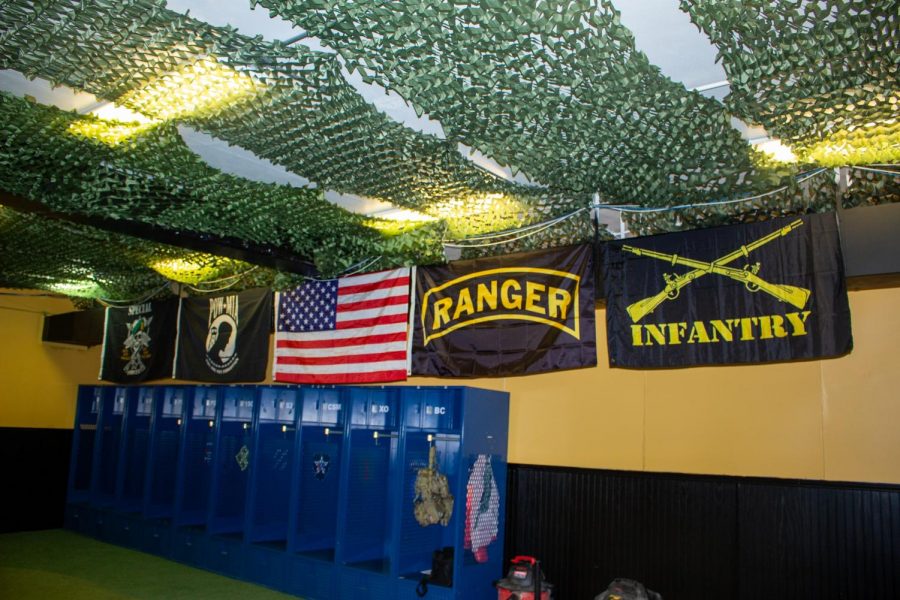Marquette ROTC, a program that trains college students for future service in various branches of the military, continues to push forward despite the unprecedented climate COVID has brought.
LTC Ioannis Kiriazis, professor of military science in the Army ROTC program, discussed the barriers COVID-19 has brought on training programs and how his team has chosen to overcome such obstacles.
Kiriazis discussed how the Army training program, titled “Advanced Camp”, was canceled due to COVID-19.
“The junior cadets are required to go to Fort Knox, Kentucky to go through Advanced Camp,” Kiriazis said. “Every junior to senior cadet goes through this, so in essence, you’re talking about nearly 6,000 that go to Fort Knox every year; Because of COVID, that was cancelled.”
Due to this cancellation, Kiriazis discussed the implementation of Operation Agile Leader, a summer training program that took the place of Advanced Camp in the summer of 2020.
“Instead of Knox, we did it (Operation Agile Leader) at Fort McCoy. All the programs in Wisconsin and the Michigan Upper Peninsula, which is seven other school programs, were involved,” Kiriazis said. “We all conglomerated on Fort McCoy, had our junior and senior cadets consolidated there and put them through a ten-day train focused on tactical leadership.”
However, in order to participate in Operation Agile Leader, cadets were required to abide by various COVID-19 precautions.
“One of the biggest things that we had back then was tracking cadet progress, they were pushed to do a 14 day self-quarantine and self-diagnosis that they would track daily. That was a required piece of documentation before allowing them to train,” Kiriazis said.
Mask enforcement and maintaining similar groups to avoid cross-contamination were also a large part of Operation Agile’s daily precautions, contributing to a record low case count.
“From that experience that we did in August — Operation Agile Leader — there was not one single case of COVID-19 that we could have attributed to coming together,” Kiriazis said.
Since Operation Agile, students in the Army ROTC program have continued to remain cautious and follow COVID-19 guidelines.
Cadet Battalion Commander Brooke Lynn Tickler, a senior in the College of Communication and cadet in the Army ROTC program, stated some of the guidelines that are implemented in day-to-day training.
“Social distancing, hand-washing, and masks at all times. We have just shy of a hundred people in our program, and obviously, that’s too many people to be in any one room all at once, so we have been trying to do as much training outdoors as possible,” Tickler said.
These guidelines have remained relatively effective for the Army ROTC on campus, as positive cases among cadets have remained under 10% since the beginning of the fall semester.
“Since the beginning of the year, we have had nine positive cases out of just over a hundred cadets,” Kiriazis said. “I tell my cadets they must conform with the policies of the university and the students have latched onto that.”
Tickler said she and fellow cadets are also playing their part in containing the coronavirus while still remaining consistent with training regimens.
“We are doing everything we can to mitigate COVID-19,” Tickler said. “But we haven’t changed our operational tempo at all. We are still getting down the training that we need because the Army doesn’t stop.”
Tickler went on to discuss the support system that the Army continues to provide amid the pandemic.
“Something that kept me grounded was not only my ROTC friends but my ROTC cadre [a group of leaders in a unit], these are people who are actually in the army and doing 20+ years and just checking in on us,” Tickler said. “In a lot of programs you don’t have these mentors or leaders who are not only concerned about your success but your overall well-being.”
Similar to the Army’s precautions surrounding COVID-19, Veronica Edwards, a sophomore in the College of Nursing and midshipman in the Navy ROTC program, stated that masks and social distancing are a crucial part of training.
“We had to shift a lot of normal in-person activities to online,” Edwards said. “We still conduct (physical training) together outside and have our ROTC lab in a classroom but we wear masks and social distance the entire time to ensure we are following guidelines and keeping everyone safe.”
Edwards also stated her appreciation for the sense of community she feels within the Navy, and hopes her ROTC unit will continue to prevail despite adversity.
“I love the camaraderie and friends I have made so far in ROTC, they feel like my family,” Edwards said. “I know that my fellow midshipmen and I have and will try our hardest to be creative and do the best we can to have a successful ROTC unit.”
This story was written by Claire Driscol. She can be reached at claire.driscol@marquette.edu

